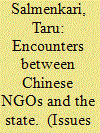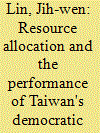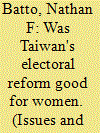|
|
|
Sort Order |
|
|
|
Items / Page
|
|
|
|
|
|
|
| Srl | Item |
| 1 |
ID:
132779


|
|
|
|
|
| Publication |
2014.
|
| Summary/Abstract |
Simultaneous rapid rise in both the world oil and agricultural commodity prices have increased interest in determining price transmission from oil prices to those of agricultural commodities. However, although a lot of the empirical research has studied the relation between oil price changes and economic activity, it is surprising that little research has been conducted on the relationship between oil price shocks and the large-size emerging industrial countries agricultural market. Therefore, the main goal of this study is that we are try to use the more detail and new China's weekly data which from 2004/9 to 2012/9 to fill this gap. This study examines the short and long-run interdependence between China fuel oil prices and the average of different kinds of key agricultural commodity prices in China. To this end, the Toda-Yamamoto causality approach and impulse response analysis method are applied to identification of the long and short-run interrelationships. In contrast to lots of the traditional causality analysis indicates that the oil prices and the agricultural commodity prices do not influence each other, our result is mix: we have inferred that the fluctuation of fuel oil price has a short-run effect on the dynamics of agricultural products in China; however, there are no significant in the long-run effects.
|
|
|
|
|
|
|
|
|
|
|
|
|
|
|
|
| 2 |
ID:
132780


|
|
|
|
|
| Publication |
2014.
|
| Summary/Abstract |
Researchers in the field of Chinese studies often assume that the ability of Chinese NGOs to operate freely increases with their distance from the government, and they classify NGOs accordingly. However, this study suggest that in China distance from the state is not a fixed characteristics of an organization nor is increased distance always an advantage. Even unregistered NGOs adopts various strategies that bring them close to the states. Forthermore, country to common expectations, independence does not guarantee that an NGO will adopt democratic decision-making structure or increase its contacts with ordinary citizens at the grassroots levels.
|
|
|
|
|
|
|
|
|
|
|
|
|
|
|
|
| 3 |
ID:
132776


|
|
|
|
|
| Publication |
2014.
|
| Summary/Abstract |
Politics always involves the exchange of resources for votes, but the mechanism differs according to the electoral institution. The principal-agent model identifies two necessary conditions for this exchange to be feasible: (1) the opportunity cost of preferential grants is small, and (2) agents receiving these resources play a vital role in helping the principal to win. These conditions were satisfied in the presidential election of 2004, when swing voters were critical in helping the Democratic Progressive Party (DPP) to retain the presidency and limited costs were attached to the resources demanded by legislators elected under the single non-transferable vole (SNTV) system. After 2004, the president no longer exchanged grants for votes at the national level because swing voters could hardly change the result of presidential elections while the opportunity cost of grants was raised by the plurality-tier of the mixed-member majoritarian (MMM) system. Nevertheless, resource allocation still dominates local politics. After MMM was introduced, DPP legislators elected in DPP-led regions distributed the resources that were helpful to consolidating potential supporters; those campaigning in KMT-administered areas, however, attempted to lure swing voters by providing them with extra services-just like what their local heads did.
|
|
|
|
|
|
|
|
|
|
|
|
|
|
|
|
| 4 |
ID:
132778


|
|
|
|
|
| Publication |
2014.
|
| Summary/Abstract |
In this paper we adopt the methodology proposed by Olley and Pakes to estimate total factor productivity in Chinese manufacturing industries using the 2001-2007 annual survey of manufacturing factories. The changes in TFP are decomposed both at the sectoral and the industry level using the Baily-Hulten-Campbell and Syrquin approaches. We find that the nature of growth of Chinese manufacturing has not changed fundamentally during the period, particularly in terms of the high dependence on intermediate inputs. At the inter-industry level, current changes in TFP mainly originate from the increase in the internal TFPs of different industries. Although the influence of structural adjustment on TFP is positive its value is still low, suggesting that significant potential for improvement in productivity in manufacturing through adjustments in structure still exists. At the intra-industry level, the improvement in TFP in different industries can be mainly attributed to the reallocation of resources and output quotas, which results from enhanced competition.
|
|
|
|
|
|
|
|
|
|
|
|
|
|
|
|
| 5 |
ID:
132777


|
|
|
|
|
| Publication |
2014.
|
| Summary/Abstract |
Relative to other countries in the world, Taiwan has consistently elected large numbers of women to political office. This paper argues that women have done well in Taiwan because of the reserved female seat system in SNTV elections and that the 2005 reform from SNTV to MMM did not produce further gains in gender equality. SNTV with reserved seats produces incentives for parties to cultivate large numbers of powerful women in order to ensure that other parties are not able to win cheap or free seats. Empirically, the evidence shows that women win significantly more votes and seats in districts with reserved seats than in those without them. Moreover, winning an SNTV election requires candidates to amass power resources, and the women who survive this arduous test have power that can be used for other political goals. Women elected on party lists do not necessarily accumulate as much power. The new MMM system has arguably not produced more female legislators than the old SNTV system would have, and it has reduced the aggregate power that women in the legislature can wield.
|
|
|
|
|
|
|
|
|
|
|
|
|
|
|
|
|
|
|
|
|